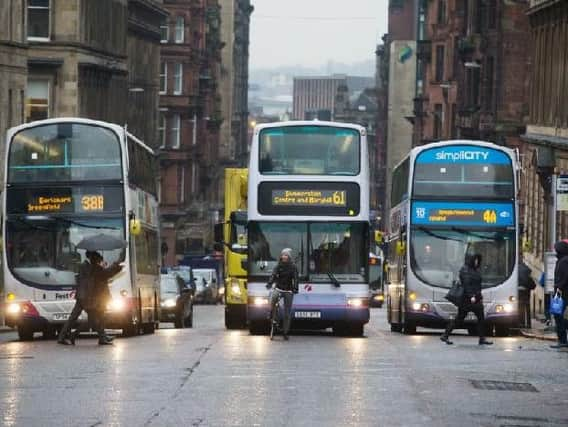'Scandal' over failure to use funding to clean-up dirty bus engines


Only £1.1 million of the £7.9m Bus Emissions Abatement Retrofit (Bear) programme was allocated in 2018-19, and the rest cannot be used this year instead.
Grants reduced nitrogen dioxide and particulate emissions from 84 buses, including 36 from Edinburgh-based Lothian Buses.
Advertisement
Hide AdAdvertisement
Hide AdOther vehicles retrofitted included Xplore Dundee, West Coast Motors and Stagecoach.
A total of 42 buses were covered in an earlier phase of the programme.
It comes as part of a crackdown on diesel emissions to improve health in Scotland’s biggest cities.
The country’s first low emission zone was introduced in Glasgow city centre in January, which will be followed by Edinburgh, Aberdeen and Dundee by the end of next year.
These will restrict vehicles to only those with the cleanest engines, with buses seen as among the greatest polluters.
Friends of the Earth Scotland (FoES) said the fund had been “snubbed” by many operators despite most of their buses not meeting the standard.
It blamed a “stand-off” between bus firms and the Scottish Government over the funding only covering 40 per cent of the cost, unlike south of the Border, with operators having to find the rest.
FoES air pollution campaigner Gavin Thomson said: “This has resulted in millions going unspent and bus exhausts remaining more dangerous to health than they should be. Everyone loses.
Advertisement
Hide AdAdvertisement
Hide Ad“Scotland’s cities have illegal, toxic levels of air pollution. Something stinks.”
The Confederation of Passenger Transport (CPT), which represents operators, said the extra costs involved in the second phase of the scheme would have forced them to raise fares and cut services.
Spokesman Paul White said: “It would be counter-intuitive to push the pace of fleet renewal to such an extent that it undermined the wider bus network and led to increased fares to accomplish this.
“CPT and the Scottish Government are engaged in discussions to ensure the next round of Bear funding mirrors European best practice.
“Should the revised Bear 3 model be approved by the European Commission, bus operators across Scotland will be poised to take up the scheme in larger numbers as part of the industry’s wider commitment to the clean air agenda.”
First Bus, Glasgow’s largest operator, said it had highlighted concerns about the viability of the scheme to the Scottish Government’s Transport Scotland agency.
Managing director Andrew Jarvis said: “The uncertainty and gap in funding has undoubtedly impacted on our retrofit programme.
“If we have to pay the difference between the 40 per cent of Bear 2 and 100 per cent of the actual cost, our only choice is for customers to pay for them as part of the prices they pay for fares.
“This is a scenario we are reluctant to put into reality.”
Advertisement
Hide AdAdvertisement
Hide AdRalph Roberts, managing director of McGill’s, which operates in the west of Scotland, said: “At this time of restricted household budgets, we felt that due to our already good environmental credentials, we would defer the decision on further retrofits until later phases of the scheme became available.”
Transport Scotland said it would “consider the shape and scope of future incentives for bus retrofitting”.
It said the average funding per bus was similar to typical grants offered to English operators.
The agency said 475 cleaner buses had previously been introduced thanks to £17m of Scottish Green Bus Fund grants over eight years.